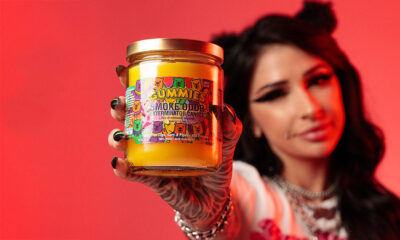
Politics
DPA’s Amanda Reiman On Why Women Are Underrepresented in the Marijuana Industry
There is a lot of talk about women in the marijuana movement coming to the mainstream media and questions about women’s’ roles within the emerging industry. I caught up with Amanda Reiman, PhD, California Policy Manager for Drug Policy Alliance (DPA) to talk about medical marijuana policy here and abroad as well as how women will shape the legal industry.
Reiman leads DPA’s marijuana reform work in California and is a decade-long resident of Oakland. Reiman joined DPA in 2012 after working with Berkeley Patients Group as director of research and patient services.
Not only is Reiman a well-respected researcher specifically on medical marijuana dispensaries and using marijuana as a treatment for addiction, she also served as the first chairwoman of the Medical Cannabis Commission for the City of Berkeley.
Currently, Reiman lectures at the University of California-Berkeley about drug and alcohol policy, substance abuse treatment and sexuality and social work.
Read the full interview in Issue 11 of Cannabis Now Magazine, on stands June 2014.
Angela Bacca: There is a lot of talk now about how women are treated and represented within the marijuana industry and movement. Do you feel that as a woman in the movement you are treated differently?
Amanda Reiman: Absolutely, without a doubt. Without a doubt. For me personally, it’s a double whammy because I am a female PhD in the cannabis industry.
On the one hand, the cannabis industry is very gendered, and I understand that. When you look at who was taking the risks of going to jail and growing cannabis, it was probably the men because women were taking care of the children. Not to sound sexist, but that is really how things used to go.
Now, we have seen that start to change. Women have gotten way more involved in drug selling, growing and manufacturing but back when cannabis [use] really started to proliferate in the fifties and sixties, it was the men that were growing it [and smuggling it].
When you think about the imagery we complain about, I really feel that is an artifact of how the growing cannabis industry was male driven in the beginning.
When we look at how a male-gendered industry has taken to advertising, has taken to magazines, you would expect the traditional sexism we see purveyed elsewhere in the country. That doesn’t surprise me in that regard.
What does surprise me is that cannabis is a female plant. I feel that we are missing a whole side to that around spirituality and feminism. Some magazines have started to get at that, but I think we have the opportunity to really elevate it above the nurses in booty shorts and to be seen more as a “goddess” plant.
AB: So you are saying that is women’s responsibility?
AR: Yes! Even though we are in this place where it is very male gendered and there is a lot of sexism we are now missing the mark. What cannabis is really about is alternative health, natural medicine. I feel that is a very feminine idea and we should be framing cannabis more as a goddess than as a sex symbol.
Now, if we are waiting around for a heterosexual cisgendered male to decide that he is tired of seeing a girl with big boobs and booty shorts holding a bud in a magazine, that day is never gonna come. As women, we need to start changing the conversation. We need to start giving the terminology, we need to start using the vocabulary.
It is probable that this image of sex and cannabis won’t go away, but it doesn’t mean that is the way it needs to go culturally. Culturally, I think we as women can raise the plant above the fray, to where we are.
One of the reasons I think women are kind of invisible in the cannabis industry is because we put ourselves above the fray. The fray is what is most noticeable in the industry. It’s the posturing, it’s the infighting, it is the jabs at each other, it’s the egos. I feel that is what comes to the forefront, and as women we lift ourselves above that because we feel we have a job to do, we have things to accomplish. We have goals, we don’t have time for that stuff.
While everyone is down here, in the fray, that’s where the spotlight is, but most women are above that doing the work. We need to figure out how we can bring the spotlight above the fray to highlight the work that we are doing more often in a better way.
AB: What is your prediction about how marijuana policy will change federally this year?
AR: Federally, we are the majority now. The people who think marijuana laws should change are the ones that are knocking down the door and demanding answers. The prohibitionists have almost retreated because they don’t have any new information. Now that all their old information has been discounted or disproved, they really don’t have anything new to offer up.
On the federal level, we are winning the hearts and minds of individual congress people. What does that mean about what is going to happen, who knows? You can have every single congress person smoking pot, if the President doesn’t want things to change they won’t change. Even though he has made comments about how he doesn’t think marijuana is any worse than alcohol, he doesn’t think we should be sending people to jail and he thinks it’s great that Colorado and Washington are having these experiments, he is also denying the fact that he has the power to change it out of Schedule I.
He absolutely has that power, and he has the power to make it legal! Or at least make medical marijuana legal.
Want to know more? Read the full interview in Issue 11 of Cannabis Now Magazine, on stands June 2014.
How do you think women should be represented in the cannabis industry and movement? Tell us in the comments below!

























